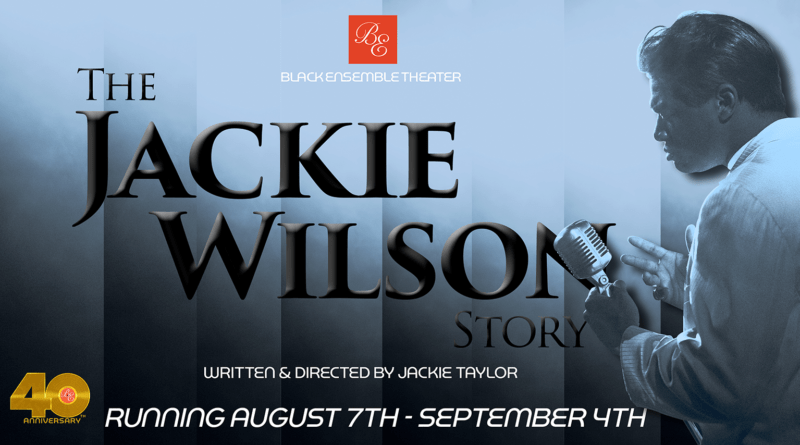The Jackie Wilson Story
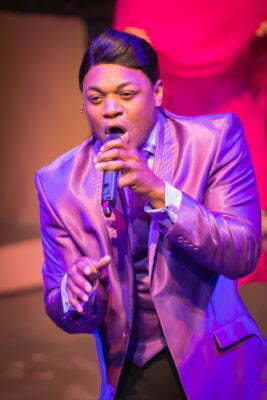
Written and Directed by Jackie Taylor.
Produced by the Black Ensemble Theater.
Revival Season Continues Its Dark Period.
Black Ensemble’s fortieth anniversary season continues with a remount of its wildly popular musical revue The Jackie Wilson Story. First produced in 2000 and originally running for two years, this creation of Black Ensemble’s founding artistic director Jackie Taylor can be thought of as an quintessential Black Ensemble show, as it depicts the tumultuous life of a mid-twentieth century titan of African-American music, contrasted with the energy of his songs and a redeeming message. Of course, since this is the anniversary season, The Jackie Wilson Story immediately follows up The Marvin Gaye Story, which was nearly the same thing. But for people wanting a second helping, this is ideal, and obviously, those who are new to either Jackie Wilson or Black Ensemble will have a blast.
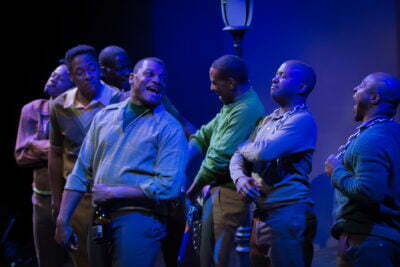 The story begins with Jackie Wilson (Kelvin Roston Jr.) in the hospital bed he has occupied since suffering a stroke onstage nine years earlier. His horrifying fate, like that of the protagonist in Johnny Got His Gun, is a never-ending case of locked-in syndrome—he is unable to even communicate that he is conscious. Though the heavy-drinking, relationship-wrecking Wilson could have anticipated some kind of downfall, this is far worse than he expected, or deserves. We see how, as a teenager in Detroit, Wilson joined a gang called The Shakers (yes, really), who tolerated him mainly because of his fantastic voice. After getting a girl pregnant, he was forced into a marriage at the age of seventeen, but his friend, B.B. (Reuben Echoles) helped him get into the nightclub crooner scene, and soon, Wilson was schmoozing his way up the talent ladder.
The story begins with Jackie Wilson (Kelvin Roston Jr.) in the hospital bed he has occupied since suffering a stroke onstage nine years earlier. His horrifying fate, like that of the protagonist in Johnny Got His Gun, is a never-ending case of locked-in syndrome—he is unable to even communicate that he is conscious. Though the heavy-drinking, relationship-wrecking Wilson could have anticipated some kind of downfall, this is far worse than he expected, or deserves. We see how, as a teenager in Detroit, Wilson joined a gang called The Shakers (yes, really), who tolerated him mainly because of his fantastic voice. After getting a girl pregnant, he was forced into a marriage at the age of seventeen, but his friend, B.B. (Reuben Echoles) helped him get into the nightclub crooner scene, and soon, Wilson was schmoozing his way up the talent ladder.
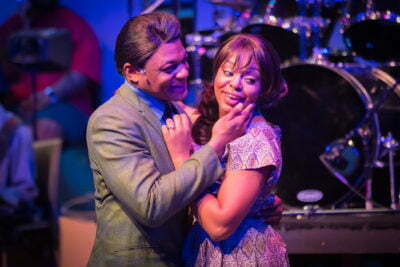
But while the legitimate record companies of the fifties and sixties were exploitative enough, Wilson wound up being controlled by the mafia. The stress of death threats and occasional beat-downs by his employers did nothing to help his alcoholism, which he developed at an earlier age, nor did it improve his temper and tendency to seek comfort in the beds of strange women. Among other tragedies, his son was murdered, and Wilson himself was shot. Roston plays Wilson with remarkable physical grace, as well as enviable vocal skills. Last year, he portrayed Donny Hathaway in Congo Square’s Twisted Melodies; as Jackie Wilson, he gets to interact directly with the audience, peddling his charm and roguish persona. Several people cheered his renditions of “To Be Loved” and “A Woman, A Lover, A Friend,” and he fully earned their approval. His “Danny Boy” was the perfect conclusion, delivered right before an uplifting encore.
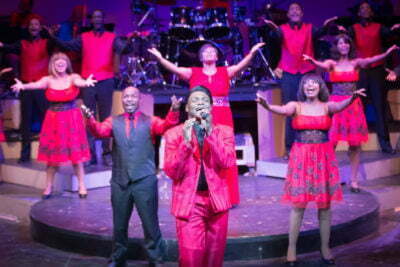 Since Black Ensemble truly is an ensemble, the usual talented crew back up Roston as other characters and dancers. “Da Doo Ron Ron” and other hits are heard in between Wilson’s numbers, and the costumes by Ruthanne Swanson, projections by Aaron Quick, scenic design by CoCo Ree Lemery, and lighting by Denise Karczewski are a visual feast. The scenic transitions are the only part of the show that needed significantly more rehearsal at opening. Certainly Robert Reddrick’s band was in top form, and from where I was sitting, seemed to have a done a better job than usual of balancing their sound. Viewed on its own, The Jackie Wilson Story is tragic, yet oddly redemptive. Bookended by The Marvin Gaye Story and the upcoming Story of Teddy Pendergrass, it’s the centerpiece in a dark trilogy which has a lot of repeating motifs, and whether that’s good or bad comes down to personal taste. But the music is always excellent.
Since Black Ensemble truly is an ensemble, the usual talented crew back up Roston as other characters and dancers. “Da Doo Ron Ron” and other hits are heard in between Wilson’s numbers, and the costumes by Ruthanne Swanson, projections by Aaron Quick, scenic design by CoCo Ree Lemery, and lighting by Denise Karczewski are a visual feast. The scenic transitions are the only part of the show that needed significantly more rehearsal at opening. Certainly Robert Reddrick’s band was in top form, and from where I was sitting, seemed to have a done a better job than usual of balancing their sound. Viewed on its own, The Jackie Wilson Story is tragic, yet oddly redemptive. Bookended by The Marvin Gaye Story and the upcoming Story of Teddy Pendergrass, it’s the centerpiece in a dark trilogy which has a lot of repeating motifs, and whether that’s good or bad comes down to personal taste. But the music is always excellent.
Recommended
Jacob Davis
Reviewed August 7, 2016
For more information, see The Jackie Wilson Story on Theatre in Chicago.
Playing at the Black Ensemble Theater Cultural Center, 4450 N Clark St, Chicago. Tickets are $55-65, with discounts for students, seniors, and groups; to order, call 773-769-4451 or visit blackensemble.org. Performances are Thursdays at 7:30 pm, Fridays at 8:00 pm, Saturdays at 3:00 and 8:00 pm, and Sundays at 3:00 pm through September 4. Running time is two and a half hours with one intermission.

